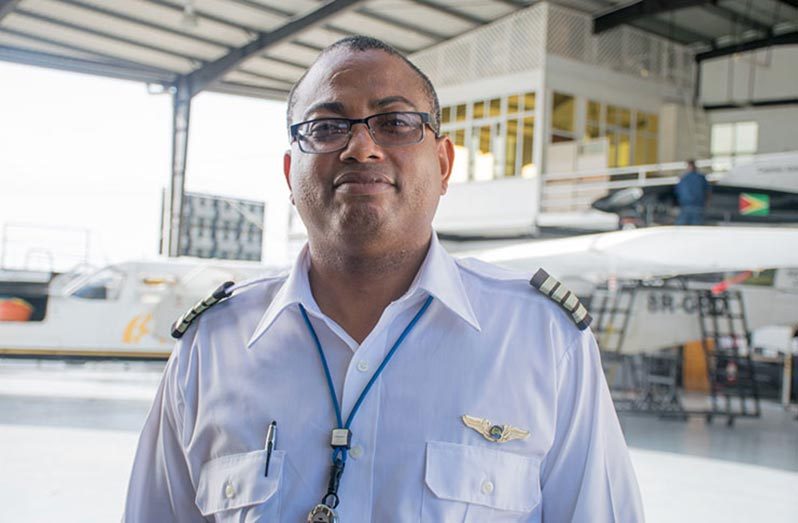– operations collectively at a 91 per cent average
WHILE domestic airlines in Guyana have experienced a decrease in revenue due to COVID-19, most airlines are operating at an average 91 per cent rate compared to their pre-COVID operations, owed partially to the boom in gold prices and demand for support to gold-mining regions.
This was relayed to this newspaper on Tuesday by Director of Operations at Roraima Airways and Secretary of the National Air Transport Association (NATA), Captain Learie Barclay.
NATA was formed by nine local aircraft operators, namely Air Services Limited, Roraima Airways Inc., Hinterland Aviation, Oxford Aviation, Fenix Airways Inc., Flights of Hope Missionary Outreach, Jags Aviation, Wings Aviation and Hopkinson Mining Aviation.
“The hike in gold prices and the fact that for many of our communities you really can’t get any commercial quantity of supplies into many interior regions other than using an airstrip, that has kept our business afloat,” Captain Barclay said.
He added: “Where we have loss, we are gaining because the surge in gold mining and the gold price means that we’re now doing a lot more flying for cargo or mining support operations; we’re adapting. We’re at about 91 per cent of what we were doing before COVID-19.”
Earlier in the month, it was reported that gold prices advanced to $2,004.97 per ounce, one of the best performing assets in 2020 despite the pandemic.
Captain Barclay said while concerns about operation have been raised by operators, they understand the importance of adapting to the health measures in place which are to ensure their safety and the safety of others.
In the August 14 updated COVID-19 measures, it was announced that no person shall travel into or out of Regions Seven, Eight and Nine during the period August 16 to August 31, 2020, without the authorisation of the minister of health.
Captain Barclay said domestic airlines have recently been receiving improved facilitation of authorisation under the new government.
“The restriction is there but the restriction has conditions and once you meet those conditions then you’ll travel,” he said, adding: “Our requirements are being responded to very quickly. Before the change of government, we were having to wait for as much as three weeks to get the requests and inquiries answered but, now, we have it answered within an hour, two hours or, max, a day. You can pick up the phone and call ministers and get clarification and they’re responding very quickly.”
NEGATIVE IMPACT
Captain Barclay said the coronavirus has also affected charters and the way they do business as well as passengers who must now ensure they are tested before travelling to Region Seven.
Speaking specifically to travel to Region Seven, he said: “Each one of the passengers [travelling to the region] now has an additional $30,000 bill to pay [for PCR tests] before they could be considered to travel on board the aircraft into a place like Issano and Kamarang. These are mining areas which are COVID-19 free because they’ve successfully managed very strict access control and have put health protocols into place.”
Furthermore, Captain Barclay said that local operators have been equally adhering to the COVID-19 Emergency Measures as established by the government as it is the responsible thing to do and will ensure that they are authorised to transport passengers and cargo.
He said the local industry has decreased its fares in many cases to cater for passengers during the financially challenging time. As result, some local airlines have had to cut their compliment of staff.
Before passengers leave the hinterland regions to travel to the capital via plane, they are subject to temperature tests, questionnaires and visual checks by airport authorities trained to look for visible symptoms of the virus.
The captain said pilots, possible flight attendants, passengers and cargo are all sanitised from head to toe by the spraying of alcohol-based sanitisers before boarding and after disembarking a flight. This is apart from the wearing of masks and observing the physical distancing guidelines in place.
When transporting a COVID-19 patient, he said only the affected person and the health worker tending to the said person are allowed onboard. No COVID-19 patient is transported without the permission of health authorities and the cost of the flight is borne by the State.
The crew onboard must suit-up in full protective gear and once the patient arrives in Georgetown, the Ministry of Health takes over. “Whatever protocols the Ministry of Health demands, we follow them,” the captain said.
Barclay noted that local airlines are hopeful that economic relief measures will be pursued by the government to address the financial challenges faced in the sector.




.png)









